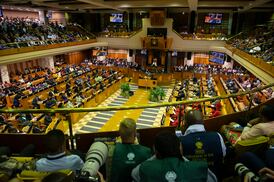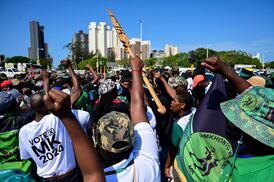When South Africa filed a case asking the International Court of Justice (ICJ) to declare that Israel, in its fight against Hamas, had breached its obligations under the UN Genocide Convention, Pretoria was excoriated by critics at home and their fellow travellers abroad.
By speaking out on the large-scale death and destruction wrought on Gaza, the South African government, it was said, was pursuing a wrong-headed, ruinous path that would cause its isolation from the Western world, particularly the US, where important trade relations would be jeopardised.
Despite the mounting Palestinian death toll, estimated today at nearly 60,000, with thousands facing starvation, the view seemed to be that South Africa must prioritise its own interests and avoid antagonising Israel and its sponsor, Washington, for which severe punishment would be incurred.
The impression was that the whole “Western world” supported Israel’s actions in Gaza, if not its intentions — with attempts made to paint South Africa as the outlier, out of tune with civilised humanity and a mindless pawn of both Hamas and Iran.
But then this week a group of nearly 30 countries including Britain, France, Canada, Australia and Japan urged Israel to immediately end its war in Gaza. Their statement criticised the “drip-feeding of aid and inhumane killing of civilians, including children, seeking to meet their most basic needs of water and food”. More than 800 Palestinians are estimated to have been killed near food distribution sites.
While calling for an immediate ceasefire and the release of the remaining hostages in Hamas captivity, the group condemned proposals to move Palestinians to a “humanitarian city” as well as the acceleration of settlement building in the West Bank, coupled with increased settler violence against Palestinians.
In a separate statement, the UN permanent missions of several states such as the Dominican Republic, Estonia, France, Germany, Ireland, the Netherlands, Norway, Sierra Leone, Sweden, Switzerland and the UK warned that “using starvation of civilians as a method of warfare may constitute a war crime”. They called on Israel, “as the occupying power, to adhere to its obligations under international law and UN Security Council Resolution 2417”. This as Brazil said it would join South Africa's ICJ case against Israel, a complaint also supported by other countries including Ireland, Spain, Turkey and Egypt.
If anything, the developments make plain that South Africa’s stance is neither isolated nor misguided.
Meanwhile, we are made to understand that Pretoria’s ICJ decision is one of the reasons for the Trump administration’s hostility towards South Africa.
So would the American position soften towards us if we abandoned the ICJ case? Would that cause a Washington rethink on the African Growth and Opportunity Act (Agoa), the suspension of aid and imposition of punitive tariffs?
That is unlikely against the deeper subtext driving the anti-South African sentiment on Capitol Hill. Essentially the complaint in the Trump administration is that South Africa, conflated with the ANC, has been acting against America’s interests. Therefore, in their view, South Africa needs to be brought into line.
Who’s to say such appeasement will not beget more demands, until we become but a glorified colony of the US, compelled even to accept their hard-core criminals, as Eswatini next door has just done?
To be charitable, we must assume that those interests do not include the peddling of the bald-faced lie to the world about a genocide in South Africa against Afrikaner farmers, or even whites in general. Nor, hopefully, do they include an intention of dictating how South Africa must deal with its inequality problem. Regarding the genocide claim, it is fair to ask whether US President Donald Trump and those who surround him would have developed the same special interest in the matter had the complainants been black South Africans.
When it comes to international relations, the US's gripe is that we have tended to not act in concert with them in global forums and have kept friends they disapprove of, such as China, Russia and Iran, but with which we have no disputes. And Trump would be thrilled to see us abandon our membership of the Brics group of nations. Put differently, the US’s friends must automatically become our friends, and ditto their enemies.
Fundamentally, the US wants South Africa to refrain from thinking or doing anything that threatens the current iniquitous world order, largely characterised by American dominance. They also find offensive our insistence on the creation of a rules-based world order (including using institutions such as the ICJ to settle international disputes). Rather, they prefer a global dispensation where might is right, where dominant countries ride roughshod over the interests of “weaker” or “smaller” states.
And so, like good slaves, we would be expected to regard America’s interests as ipso facto our interests. That is the South Africa that the US and its local fans would like to see. In the final analysis, both our domestic and foreign policy would be subject to US fiat.
And who’s to say such appeasement will not beget more demands, until we become but a glorified colony of the US, compelled even to accept their hard-core criminals, as Eswatini next door has just done?
As an aside, there should be no problem with South Africa engaging with the US, or any other country, as mutually respectful partners who sometimes agree to disagree. But the demand here is for us to forsake our independence and surrender our sovereignty, on pain of being punished with economic sanctions and such like. To accept this would be to sign ourselves and future generations of South Africans into effective slavery.
With more pressure looming from the US, what are we to do, faced with this invidious choice for our country? We may have reached a moment of truth: proverbially to die on our feet, or live on our knees. It’s a choice to truly concentrate our minds.
• Makhudu Sefara is away. His column resumes next week





Would you like to comment on this article?
Sign up (it's quick and free) or sign in now.
Please read our Comment Policy before commenting.